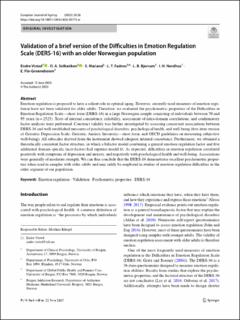| dc.contributor.author | Visted, Endre | |
| dc.contributor.author | Solbakken, Ole Andre | |
| dc.contributor.author | Mæland, Silje | |
| dc.contributor.author | Fadnes, Lars T. | |
| dc.contributor.author | Bjerrum, Louise | |
| dc.contributor.author | Nordhus, Inger Hilde | |
| dc.contributor.author | Flo-Groeneboom, Elisabeth | |
| dc.date.accessioned | 2023-06-27T06:42:01Z | |
| dc.date.available | 2023-06-27T06:42:01Z | |
| dc.date.created | 2023-06-22T13:46:09Z | |
| dc.date.issued | 2023 | |
| dc.identifier.issn | 1613-9372 | |
| dc.identifier.uri | https://hdl.handle.net/11250/3073325 | |
| dc.description.abstract | Emotion regulation is proposed to have a salient role in optimal aging. However, currently used measures of emotion regulation have not been validated for older adults. Therefore, we evaluated the psychometric properties of the Difficulties in Emotion Regulation Scale—short form (DERS-16) in a large Norwegian sample consisting of individuals between 70 and 95 years (n = 2525). Tests of internal consistency, reliability, assessment of intra-domain correlations, and confirmatory factor analyses were performed. Construct validity was further investigated by assessing concurrent associations between DERS-16 and well-established measures of psychological disorders, psychological health, and well-being (five-item version of Geriatric Depression Scale, Geriatric Anxiety Inventory—short form, and OECD guidelines on measuring subjective well-being). All subscales derived from the instrument showed adequate internal consistency. Furthermore, we obtained a theoretically consistent factor structure, in which a bifactor model combining a general emotion regulation factor and five additional domain-specific facet-factors had superior model fit. As expected, difficulties in emotion regulation correlated positively with symptoms of depression and anxiety, and negatively with psychological health and well-being. Associations were generally of moderate strength. We can thus conclude that the DERS-16 demonstrates excellent psychometric properties when used in samples with older adults and may safely be employed in studies of emotion regulation difficulties in the older segment of our population. | en_US |
| dc.language.iso | eng | en_US |
| dc.publisher | Springer | en_US |
| dc.rights | Navngivelse 4.0 Internasjonal | * |
| dc.rights.uri | http://creativecommons.org/licenses/by/4.0/deed.no | * |
| dc.title | Validation of a brief version of the Difficulties in Emotion Regulation Scale (DERS-16) with an older Norwegian population | en_US |
| dc.type | Journal article | en_US |
| dc.type | Peer reviewed | en_US |
| dc.description.version | publishedVersion | en_US |
| dc.rights.holder | Copyright 2023 the authors | en_US |
| dc.source.articlenumber | 26 | en_US |
| cristin.ispublished | true | |
| cristin.fulltext | original | |
| cristin.qualitycode | 1 | |
| dc.identifier.doi | 10.1007/s10433-023-00775-w | |
| dc.identifier.cristin | 2157148 | |
| dc.source.journal | European Journal of Ageing | en_US |
| dc.identifier.citation | European Journal of Ageing. 2023, 20, 26. | en_US |
| dc.source.volume | 20 | en_US |

